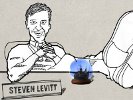Eye For Film >> Movies >> Freakonomics (2010) Film Review
Back in 2005, "rogue economist" Steven Levitt and journalist Stephen Dubner teamed up to write Freakonomics - a book that promised to explore "the hidden side of everything". It was a huge hit and so it is little surprise that someone tried to turn it into a documentary. Presumably because of the dip-in/dip-out nature of the book, producers Chris Romano, Dan O'Meara and Chad Troutwine decided that rather than just taking one story and exploring that, they would create a portmanteau doc, comprising four specific chapters - A Roshanda By Any Other Name, Pure Corruption, It's Not Always A Wonderful Life and Can You Bribe A Ninth Grader To Succeed? - linked by a series of additional mini-docs exploring broader concepts such as incentives and causality vs correlation.
The subject matter may be comparatively lightweight, but the directorial team assembled includes some seriously heavy hitters - Super Size Me's Morgan Spurlock, Taxi To The Dark Side Oscar-winner Alex Gibney, Why We Fight helmer Eugene Jarecki, and the, perhaps lesser-known, pairing of Rachel Grady and Heidi Ewing, who made the excellent Boys Of Baraka and Jesus Camp. Stringing them all together is King Of Kong director Seth Gordon, whose link sections are useful, in that they allow us to get a good look and listen to Dubner and Levitt, but which often don't completely gel with the individual chapters.

The end result is brisk and entertaining to a point, but the limited time given to each of the short films means that there is little opportunity to get really down and dirty with the number-crunching, so that for every aspect that is fascinating there is an attendant frustration. Some of the points made, particularly in Morgan Spurlock's A Roshanda By Any Other Name, which examines the importance, or not, of what you call your child, also suffer from feeling like statements of the obvious. His energetic if inconclusive film mostly confirms that it is your socio-economic background which determines success or failure, although conclusions drawn regarding typically 'black' and 'white' names, somewhat less concrete.
Alex Gibney's segment, Pure Corruption - concerning cheating in sumo wrestling - has a much more traditional approach to its subject matter, exploring the difference between the importance of a 'pure facade' and underlying corruption. There is an attempt to extrapolate away from the idea of cheating almost being sanctioned just so long as the facade remains intact to the state of a US economic landscape which permitted Bernie Madoff to get away with ripping off millions for years, but there isn't really enough of a parallel drawn to make the idea stick.
Visually compelling, but again rather light on real detail, is Eugene Jarecki's It's Not Always A Wonderful Life. By far the most controversial segment of the film, it explores Levitt's contention that the legalisation of abortion via Rowe vs Wade in the States resulted in fewer "unwanted" children being born which, in turn, led to a drop in the crime rate 20 years later. Excellently illustrated by some thought-provoking graphics, deftly narrated by Melvin Van Peebles and making good use of Frank Capra's film as a counterpoint, there is a feeling of the surface being skimmed rather too much so that you're still left wondering quite how A and B have added up to C by its conclusion.
The segment which works the most successfully is that by Rachel Grady and Heidi Ewing. This is quite possibly because Can You Bribe A Ninth Grader To Succeed? shows an actual incentive experiment in action, allowing the filmmakers to make the greatest departure from theory in favour of practise. They get excellent access to two very different teenagers taking part in a scheme which offers to pay students $50 each month if they get their grades up. Blessed with terrific subjects - Urail King and his mother are particularly excellent value - they touch on some interesting concepts, such as the idea that social incentives, like being the class clown, may be more important than fiscal ones. The only annoying aspect of this chapter is that one of the kids is shown receiving a $500 cheque in a raffle which, it turns out if you listen to the commentary track, is intended to be a 'dream sequence' added by the documentarians and didn't actually happen - not a great editorial choice, as the result is that you start to question other aspects of this otherwise very well made film.
Intended as a sort of primer rather than an exhaustive exploration, Freakonomics is successful to the extent that its easy going accessiblity might well encourage a casual viewer who generally feels turned off by the idea of documentaries to go and seek out other work by the filmmakers involved or that cover the same subject matter in more depth. For those who watch a lot of factual films anyway, however, this may well feel aggravatingly shallow and rather too obvious.
Reviewed on: 14 Jan 2011



















